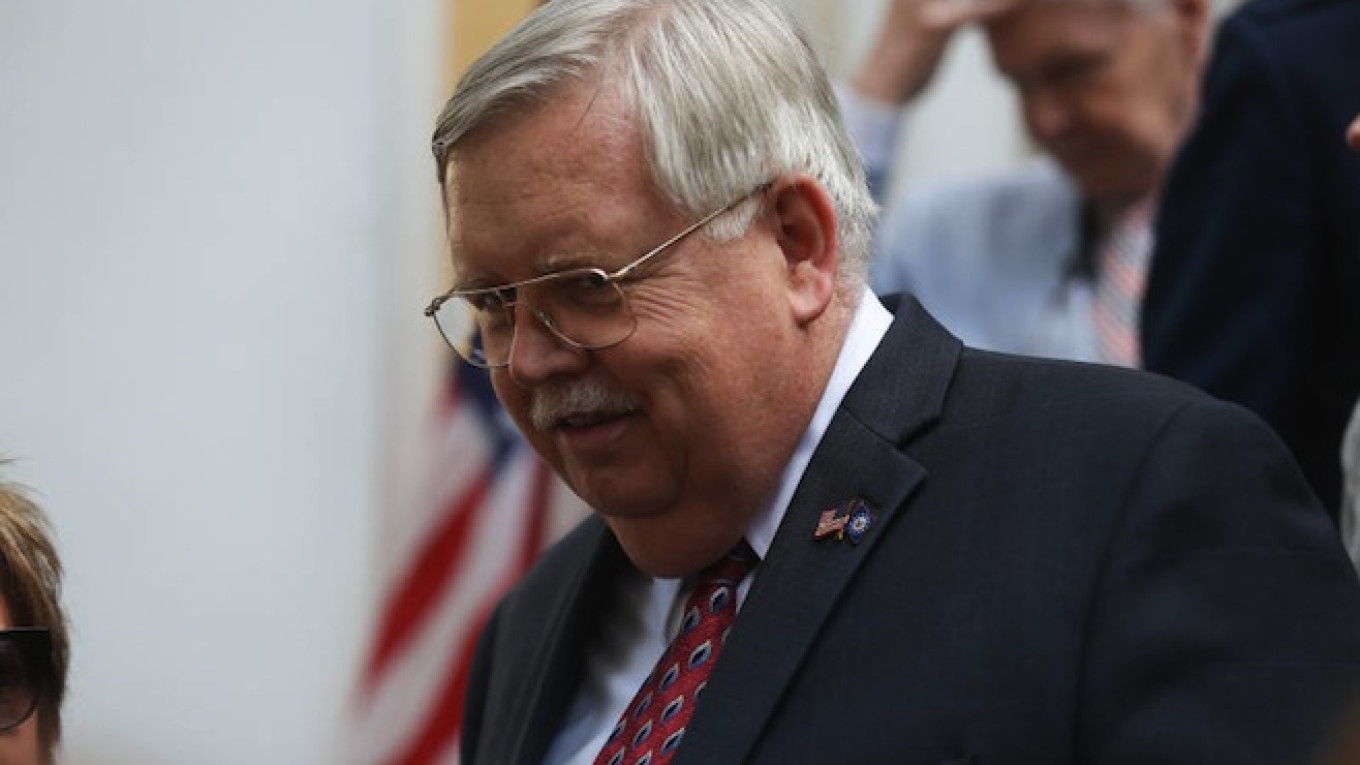Sanctions against Moscow can be lifted after it implements the Minsk peace agreement with Ukraine, including restoration of Kiev control over separatist eastern regions, the U.S. Ambassador in Moscow John Tefft said in an interview published on the U.S. Embassy's website Thursday.
Washington has the full backing of its European allies in demanding the fulfillment of the Minsk deal before Western nations would consider lifting their sanctions, Tefft said in an interview with a Russian news agencies.
“On sanctions, we’ve made it very clear — the president, the secretary [of state] ?€” it means the implementation of the Minsk agreements,” Tefft said. ?€?And on that, we and our European allies are solid. Germany and France and we and all of the rest of the European Union are very serious about wanting to implement Minsk in its totality.?€?
The deal, agreed upon by the leaders of Ukraine, Russia, France, and Germany during talks in Belarussian capital Minsk a year ago, calls for unconditional ceasefire between Kiev forces and Moscow-backed separatists in the east, withdrawal of heavy weapons, and pullout of ?€?foreign armed formations?€? and ?€?mercenaries?€? from the rebel regions.
The deal also envisages restoring Kiev's control over Ukraine's national borders throughout the conflict zone, but calls for constitutional reform to give the rebel Donetsk and Luhansk regions a degree of autonomy.
?€?Russia still has military troops inside of Donetsk and Luhansk ?€” President [Vladimir] Putin said as much in one of his recent press availabilities ?€” and we?€™d like to see them out of there,?€? Tefft said.
Moscow had long claimed that all Russian citizens fighting alongside separatist insurgents were volunteers. But Putin conceded during his major annual news conference on Dec. 17, 2015 that his government has some military representatives in the region ?€” though he denied they were regular troops.
?€?We have never said that there are no people there who are engaged in solving certain issues, including in the military sphere, but that doesn't mean that regular Russian forces are present there,?€? Putin said. ?€?Feel the difference.?€?
Putin had also denied that Russia had dispatched troops to Crimea before annexing the Black Sea peninsula from Ukraine in 2014. But he acknowledged months later that scores of fighters in uniforms without insignia who had overrun the peninsula were Russian troops.
Moscow now accuses Kiev of failing to deliver on the Minsk deal, particularly the part calling for constitutional changes. But Ukraine and Western governments maintain that the fault for the deal's falling through lies mostly with Moscow.
?€?Ukraine has responsibilities here, too. There are issues that both sides need to resolve at this point,?€? Tefft said, adding: ?€?Ukraine has made some very serious steps forward in passing the first reading of the Special Status Law, in doing the first steps on the constitutional amendment, and that needs to be continued and fulfilled.?€?
?€?We want to see a restoration of Ukrainian sovereignty in Donetsk and Luhansk as Minsk prescribes,?€? he said. ?€?Until all of the pieces are done, we won?€™t be satisfied. And I think, frankly, Germany and France will not be satisfied either.?€?
After cheering the annexation of Crimea and initially applauding Moscow's support for Ukraine's separatists, Russians have lately been growing disillusioned with their country's policies: Support for Russia's ?€?course?€? has dropped to 45 percent this month from 64 percent last summer, a poll released this week by independent Levada Center indicates.
The ruble's continued nosedive and crumbling living standards appear to be the main factors. A ban on Western food imports, which Moscow introduced in response to Western sanctions, also does not seem to sit well with many Russians, who hunger for vanished delicacies, such as European cheeses.
?€?There was a lot of cheese when I came back on the Aeroflot flight from the United States, there were a lot of Russians on there with cheese,?€? Tefft said. ?€?I could smell it on the plane.?€?
?€?I?€™m sure that there are certain companies whose imports ?€” whether they be chicken or whatever ?€”have felt that pain [of Moscow's import ban],?€? he said. ?€?But, my own sense is that some of the sanctions that Russia put on toward the West have caused as much pain here in Russia as they have vis-à-vis Europe or the United States.?€?
A Message from The Moscow Times:
Dear readers,
We are facing unprecedented challenges. Russia's Prosecutor General's Office has designated The Moscow Times as an "undesirable" organization, criminalizing our work and putting our staff at risk of prosecution. This follows our earlier unjust labeling as a "foreign agent."
These actions are direct attempts to silence independent journalism in Russia. The authorities claim our work "discredits the decisions of the Russian leadership." We see things differently: we strive to provide accurate, unbiased reporting on Russia.
We, the journalists of The Moscow Times, refuse to be silenced. But to continue our work, we need your help.
Your support, no matter how small, makes a world of difference. If you can, please support us monthly starting from just $2. It's quick to set up, and every contribution makes a significant impact.
By supporting The Moscow Times, you're defending open, independent journalism in the face of repression. Thank you for standing with us.
Remind me later.


